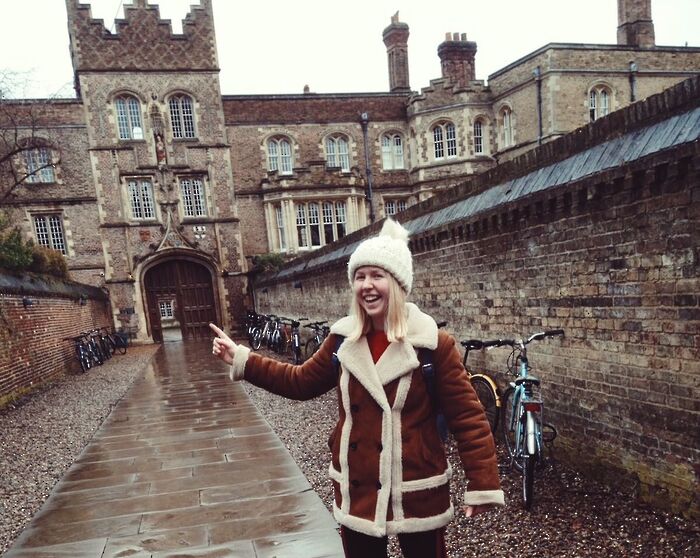Making a place your home
In the latest Letter to Freshers, Gabrielle Brucciani reflects on what ‘home’ means to her

Right now I’m surrounded by boxes of all shapes and sizes. There’s a green bag with all my clothes, a red one with my sheets and pillows, and a white box spilling over with kitchen bric-a-brac. In other words, it’s your classic moving-back-to-uni bombsite.
It feels strange going back to Cambridge after having spent the past year in Italy and France. Most of my friends have graduated and it almost feels like I’m having to go through freshers’ week all over again. Who will I hang out with? Will it feel like home? How will I cope with the workload this year? You’d think that after three years of university and having lived in three different countries, I’d be less nervous about moving again.
What would you say to your fresher self?
Write for Varsity's annual series, Letters to Freshers. Just email our Features team with a 150-word pitch with a story to tell about your time at Cambridge.
I don't know what happens to make a place feel like home. I don't know why some places can feel like home and others not, nor why a place can feel like home to one person and not to another. I've thought about it a lot: is it the language? is it the buildings? is it having something to do in that place? is it the food? is it the people?
I have several places that I call "home": there's "home home," where my family lives; my boyfriend's house; Cambridge, where I spent the first two years of my degree; and, for the duration of my year abroad, there was also Bologna and Paris. For a while, Paris has been the home-iest of the homes as that’s where I was living most recently, and I hope that Cambridge will soon have that title again. My family home in the UK will always be home, but more a home that I return to rather than a home that I stay in. It's confusing sometimes, but it makes sense to me.
I'm a firm believer that people can have more than one place they call home, and I'm an even stronger believer in the fact that ‘home’ is more about the people who are there rather than the physical space itself. Paris felt so welcoming when I opened the door of our flat to a note that read "Welcome home Gaby!" written by my flatmate and fellow Cambridge student, Laura , who burst through the door barely twenty minutes later triumphantly brandishing a bottle of wine and smothering me in hugs. A couple of days later, we set out to Tiger where we spent an embarrassing amount of money buying goodies and knick knacks to make our house feel more like home.
A place will never become home if you don't want it to be, just like you can choose to make anywhere home
The process of making a place a home is a two-way street. It's about feeling like you belong to a place, like you and others there share something in common to bond and connect over, like you're not an outsider but an insider. But a place becoming home is also about you making your mark on that place: having your favourite cafés or streets, having a regular supermarket, talking with the neighbours, or putting up decorations in the kitchen and other shared spaces. Bringing my favourite coffee from home, making my mum’s version of carbonara, and putting up silly photos of happy times were all little things that made where I lived feel (and smell) familiar.
Ironically, in order to be able to call a place home, I've always needed to have the possibility of leaving that place behind. I went to boarding school and it didn't feel like home for a few reasons, but chief among them was that I didn't have the freedom to come and go as I pleased (although in retrospect, it was not really surprising that they didn't let a twelve-year-old child just wander off).
I was an insider but I felt trapped inside, rather than an outsider who had discovered a sense of attachment to the place to become an insider. Now, when I’m away, the occasional trip home or phone calls with friends in other places keep me feeling connected with the people I love without feeling like I’m trapped. If you’re not in the habit of video calling, start now. There’s nothing nicer than seeing a friendly face.
What makes a home a home is still something that I’m trying to figure out. I think everyone will agree, however, that home is a place where you feel like you belong and where you feel happy and safe. How a place becomes a home is sometimes a mystery, but personally I believe that it's a mixture of fate and choice: a place will never become home if you don't want it to be, just like you can choose to make anywhere home.
 Comment / Cambridge students are too opinionated 21 April 2025
Comment / Cambridge students are too opinionated 21 April 2025 Interviews / Meet the Chaplain who’s working to make Cambridge a university of sanctuary for refugees20 April 2025
Interviews / Meet the Chaplain who’s working to make Cambridge a university of sanctuary for refugees20 April 2025 News / News in brief: campaigning and drinking20 April 2025
News / News in brief: campaigning and drinking20 April 2025 Comment / Cambridge’s tourism risks commodifying students18 April 2025
Comment / Cambridge’s tourism risks commodifying students18 April 2025 Comment / Cambridge’s gossip culture is a double-edged sword7 April 2025
Comment / Cambridge’s gossip culture is a double-edged sword7 April 2025






